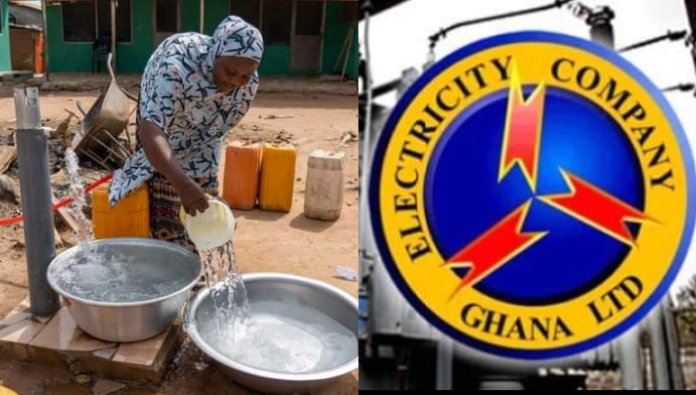The Food and Beverages Association of Ghana has challenged President John Dramani Mahama to launch comprehensive reforms of the Electricity Company of Ghana and Ghana Water Company within 30 days, arguing that fixing these utilities would be the administration’s greatest legacy.
John Awuni, FABAG chairman, described efficiency in the utility sector as critical to Ghana’s economic growth during a press engagement where the association presented a petition to the president. Copies were also delivered to the Minister of Energy, the Parliamentary Select Committee on Mines and Energy chairman, and the Public Utilities Regulatory Commission.
“We therefore respectfully ask His Excellency the President to act decisively within the next 30 days to launch a presidential compact for ECG. Efficiency before tariff is the reform Ghana needs, not tariff before efficiency,” Awuni stressed, articulating what has become a rallying cry for industry groups frustrated with utility performance.
The challenge represents mounting pressure from Ghana’s business community on utilities that many manufacturers blame for hampering industrial competitiveness. FABAG’s intervention comes as the government considers tariff adjustments that would further increase costs for businesses already struggling with high production expenses.
Awuni argued that reforming ECG and Ghana Water Company would deliver benefits felt across the entire economy. “The greatest legacy the Mahama government respectfully can leave is to fix ECG and Ghana Water Company once and for all. And if done, every Ghanaian will feel the benefits of good governance through a sustainable increase in economic activities and reduction in the cost of goods and services,” he said.
The association chairman emphasized that Ghana deserves a utility sector that powers growth rather than one that drains economic vitality. His comments reflect broader frustration with recurring inefficiencies that manufacturers say inflate production costs, reduce competitiveness, and ultimately raise prices for consumers.
FABAG members are reportedly unwilling to pay higher tariffs to companies they describe as riddled with waste and corruption. The association warned that approving new tariff hikes for utilities, especially ECG and Ghana Water Company, without deep reforms would constitute profound injustice to businesses and households already bearing heavy utility cost burdens.
Awuni highlighted how inefficiencies have direct impact on production costs and living standards. “Ghanaians’ cost of living will be brought down because cost, electricity and water, is the major foundation cost of every production system. And the industry has been struggling for years, not because of some other issues, they may be there, but largely because of the inefficiencies of their utilities, particularly ECG and the Ghana Water Company,” he explained.
The petition connects utility reform to the administration’s flagship 24-hour economy policy. Awuni expressed optimism that coordinated efforts could bring lasting solutions enabling the policy’s success. “We believe that together we can achieve a lasting solution in the utility sector that Ghanaians will enjoy. The 24-hour economy will succeed. Industrial takeoff will be meaningful and sustainable,” he said.
The linkage makes sense. Operating businesses around the clock requires reliable electricity and water supply. If utilities cannot guarantee consistent service even during regular business hours, extending operations to 24-hour cycles becomes impractical for most manufacturers.
Ghana’s utility sector challenges are well documented. ECG continues recording substantial technical and commercial losses through electricity theft, billing inefficiencies, and collection problems. Ghana Water Company faces similar issues with non-revenue water, aging infrastructure, and operational inefficiencies that keep service delivery below acceptable standards.
These problems persist despite repeated reform attempts over successive governments. ECG has undergone various restructuring initiatives, management changes, and even a controversial private sector participation arrangement that was later reversed. Yet fundamental performance issues remain unresolved.
The 30-day timeline Awuni proposes is ambitious, perhaps unrealistically so. Comprehensive utility reform typically requires sustained effort over months or years, not weeks. However, the timeline may be more about signaling urgency than expecting complete transformation within a month.
What FABAG appears to want is visible presidential commitment demonstrated through launching a reform initiative with clear timelines, measurable targets, and accountability mechanisms. A “presidential compact” suggests bringing together stakeholders around agreed objectives with high-level political backing to overcome bureaucratic resistance.
The “efficiency before tariff” mantra challenges the conventional utility regulatory approach. Typically, regulators approve tariff increases when utilities demonstrate cost recovery needs. FABAG argues this sequence should reverse: utilities should first demonstrate improved efficiency, then seek tariff adjustments based on leaner cost structures.
This approach would require utilities to find internal efficiencies rather than passing inefficiencies to customers through higher rates. It’s appealing to consumers and businesses but potentially challenging for utilities genuinely needing investment to upgrade aging infrastructure and improve service quality.
The tension reflects a credibility problem. After years of poor performance, businesses and households doubt that tariff increases will translate into better service. They’ve paid higher rates before without seeing corresponding improvements, breeding skepticism about any utility promises of reform.
Whether President Mahama responds to FABAG’s challenge within the specified timeline remains to be seen. The administration has emphasized resetting governance systems and improving public sector performance, which logically includes utilities. However, political will alone doesn’t guarantee successful reform when structural and institutional challenges run deep.
For Ghana’s manufacturing sector, reliable and affordable utilities aren’t luxuries but necessities for competitiveness. As the country pursues industrialization goals and regional trade opportunities under the African Continental Free Trade Area, utility inefficiencies become increasingly costly handicaps.
FABAG’s petition adds business community voices to public frustration with utility performance. If the administration takes up the challenge, it could catalyze long-overdue reforms. If the petition goes unanswered or produces only cosmetic changes, it will reinforce perceptions that Ghana’s utility problems are intractable despite their obvious economic costs.
The coming weeks will reveal whether the president treats this as a priority worthy of immediate attention or another in a long series of calls for utility reform that generate temporary activity but little lasting change.
Watch video below;
Source: newsghana.com.gh











